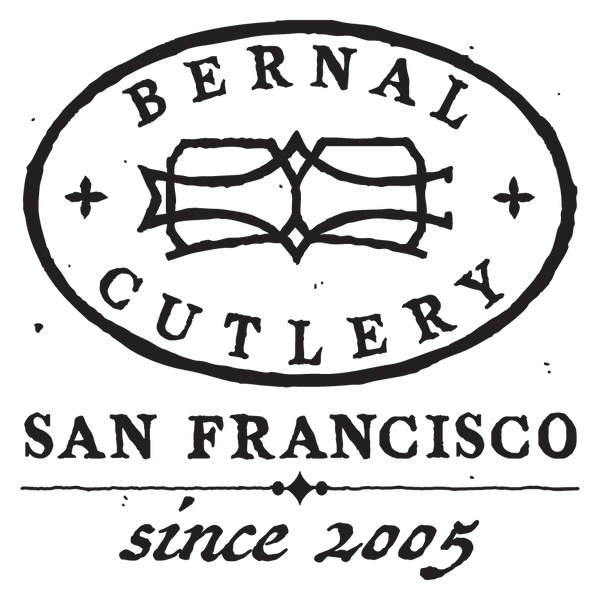Please read our message regarding changes regarding tariff impacts. Changes go into effect Wednesday Oct 22.
-
Langue
-
Devise
-
NEW
- All New Products
- New Kitchen Knives
- New Kitchen Tools
- Latest Vintage
- New Pocket & Outdoor
- New Pantry
-
What's in my Basket Series
- Nite Yun - Lunette
- Scott & Frost Clark - Dad's Luncheonette, Chef & Author
- Angela Wilson - Avedano's
- Susan Kim - Eat Doshi
- Seth Stowaway - Osito
- Dr. Harold McGee - Author
- Ryo Sakai -Kuma Sushi
- Ian McNemar - Woodworker, Instructor
- Anna Voloshyna - Author
- Jorge Martinex Lillard - Lolo´
- Chris Yang - Piglet & Co
- Griffin Wilson - @cabincorn
- Gabe Rudolph - Gestura Utensils
- Molly DeCoudreaux - Food Photographer
- Geoff Davis - Burdell Soul Food
- Jen and Wes - @crazythickasians
- Josh Donald - Bernal Cutlery
- Kelly Kozak - Bernal Cutlery
- Jessica Sullivan - Poppy SF
- Sylvan Mishima Brackett - Rintaro
- Michael Myers - Film Character
- Ali Hooke - @alihooke
- Bruce Hill - The Chef's Press
- Dylan Carasco - Butcher's Guide
- Spencer Horowitz - Hadeem
-
Japanese Knives
- Ashi Hamono
- Gihei Knives
- Godo Tadaharu
- Hatsukokoro
- Hitohira
- Iwasaki Kamisori
- Kaji-Bei
- Kamo Shiro
- Kanehide
- Konosuke
- MAC Knife
- Masakane
- Makoto Tadokoro Marushin
- Morihei
- Myojin Riki Sesakusho
- Nakagawa Hamono
- Naozumi
- Nigara Hamono
- Sakai Kikumori
- Shigefusa
- Tagai
- Takada no Hamono
- Tanabe Tatara
- Tosa
- Tsukasa Hinoura
- Yoshikane
- Yoshikazu Tanaka
- Wakui
-
Global Knives
- Allday Goods (GBR)
- Alma Knife Co. (USA)
- Astral Works (USA)
- Au Sabot (FRA)
- AZ Knives (ARG)
- Benchmade Cutlery (USA)
- Bernal Cutlery (USA)
- Blenheim Forge (GBR)
- Chazeau Honoré (FRA)
- Dexter Russell (USA)
- Eichenlaub Tableware (DEU)
- Florentine Kitchen Knives (ESP)
- Fontenille Pataud (FRA)
- Friedr Herder (DEU)
- J Adams (GBR)
- John Nowill & Son (GBR)
- K Sabatier (FRA)
- Pallares (ESP)
- Roland Lannier (FRA)
- Rolin Knives (USA)
- Silverthorn (USA)
- Steelport Knife Co. (USA)
- Windmühlenmesser (DEU)
- Zirh (TUR)
-
Styles
- Bernal Cutlery Collaborations
- Knife Sets
- Japanese Kitchen Knives
- Western Kitchen Knives
- Chinese Style Cleavers
- Bread
- Butchery
- Cheese | Charcuterie
- Pocket | Folding
-
Outdoor
- A Wright & Son (GBR)
- Au Sabot Folders (FRA)
- Benchmade (USA)
- Buck Knives (USA)
- David Margrita (FRA)
- Friedr Herder (DEU)
- Fontenille Pataud (FRA)
- Helle (NOR)
- Higonokami
- Hults Bruk Axes (SWE)
- Ibberson (GBR)
- Joseph Rogers & Sons (GBR)
- Kalthoff Axes (SWE)
- MOKI Knives (JPN)
- Morakniv (SWE)
- Opinel (FRA)
- Pallares (ESP)
- Tactile Knife Company (USA)
- Wood Tools (GBR)
- Vintage & New Vintage
- Woodworking | Hobby | Craft
- Kamisori Razors
- Carving Forks | Knives | Sets
- Table | Steak
- Fixed Blades | Axes | Outdoor Tools
- Scissors | Shears | Snips
- Left Handed
- Vintage
- Sharpening
- Kitchen | Cookware
- Tableware | Service
- Pantry
- Accessories
- Deals
- Gift Cards
- INFO
ou
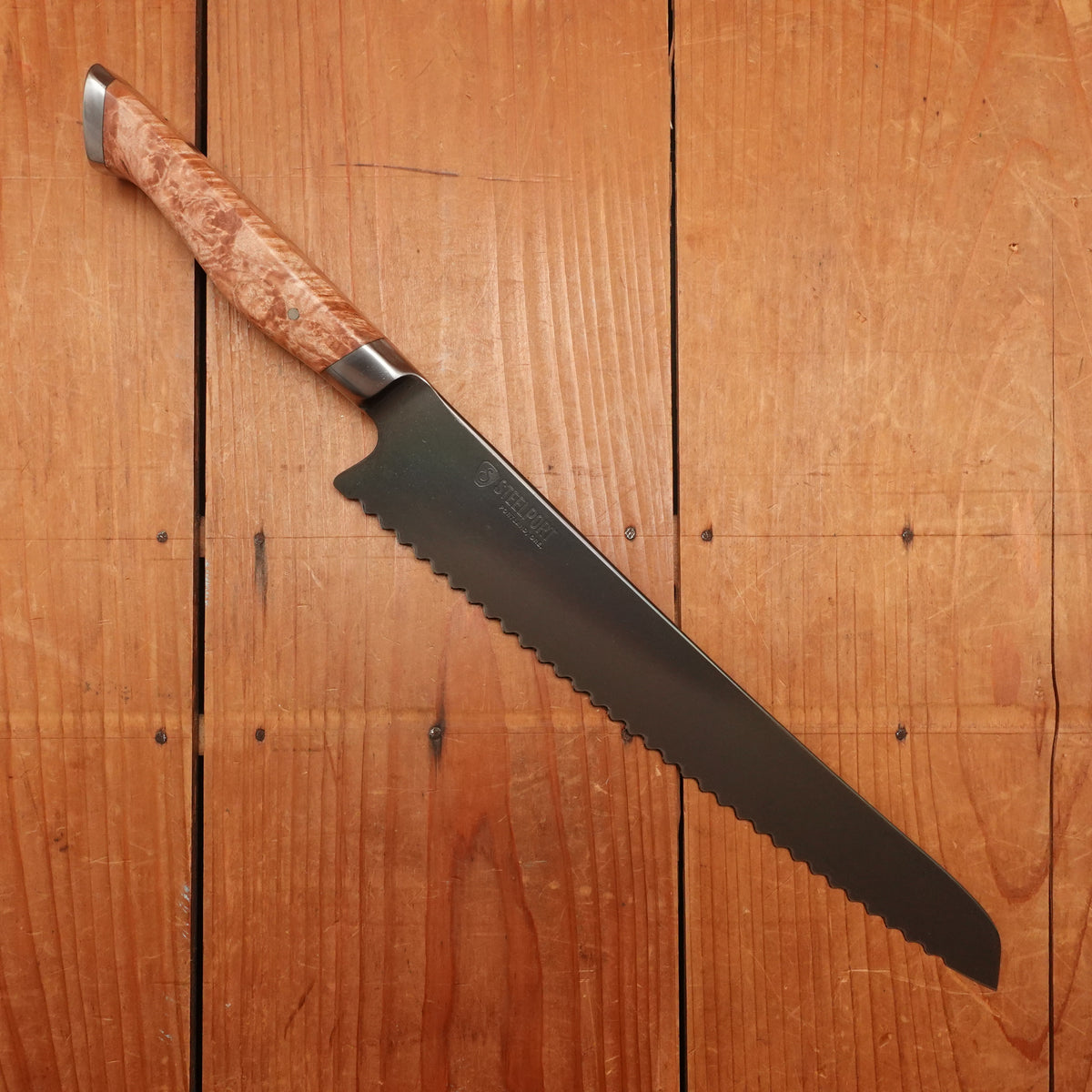
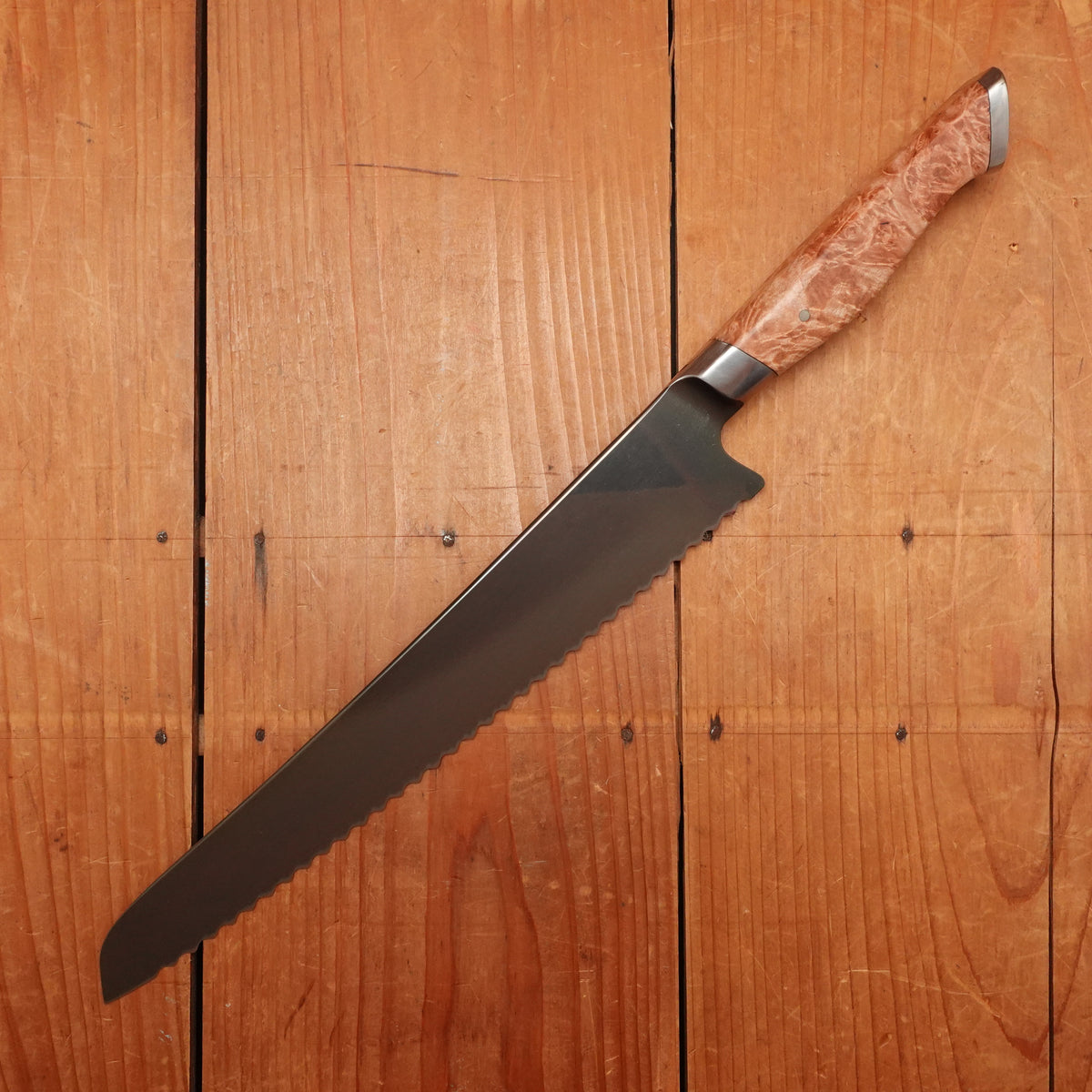
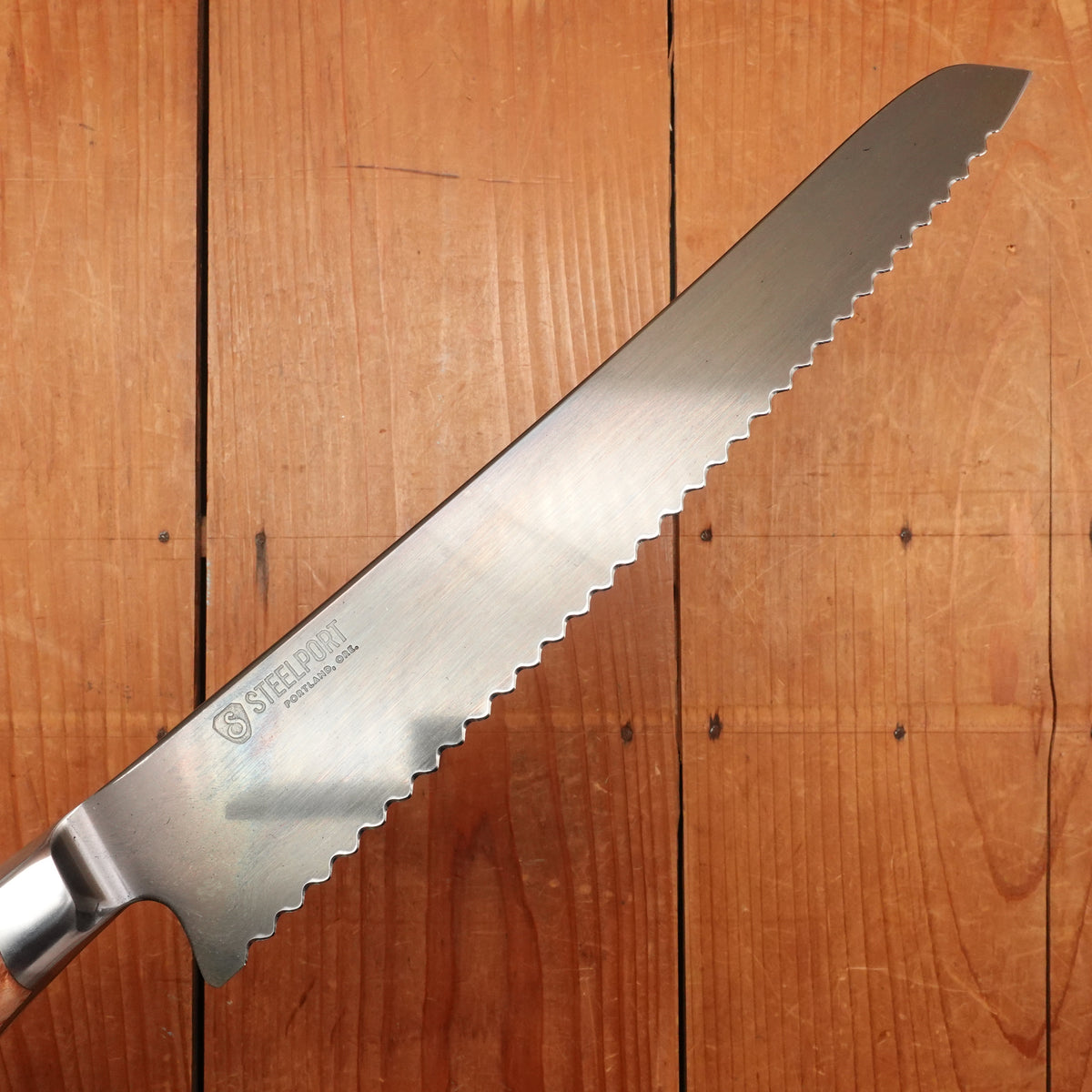
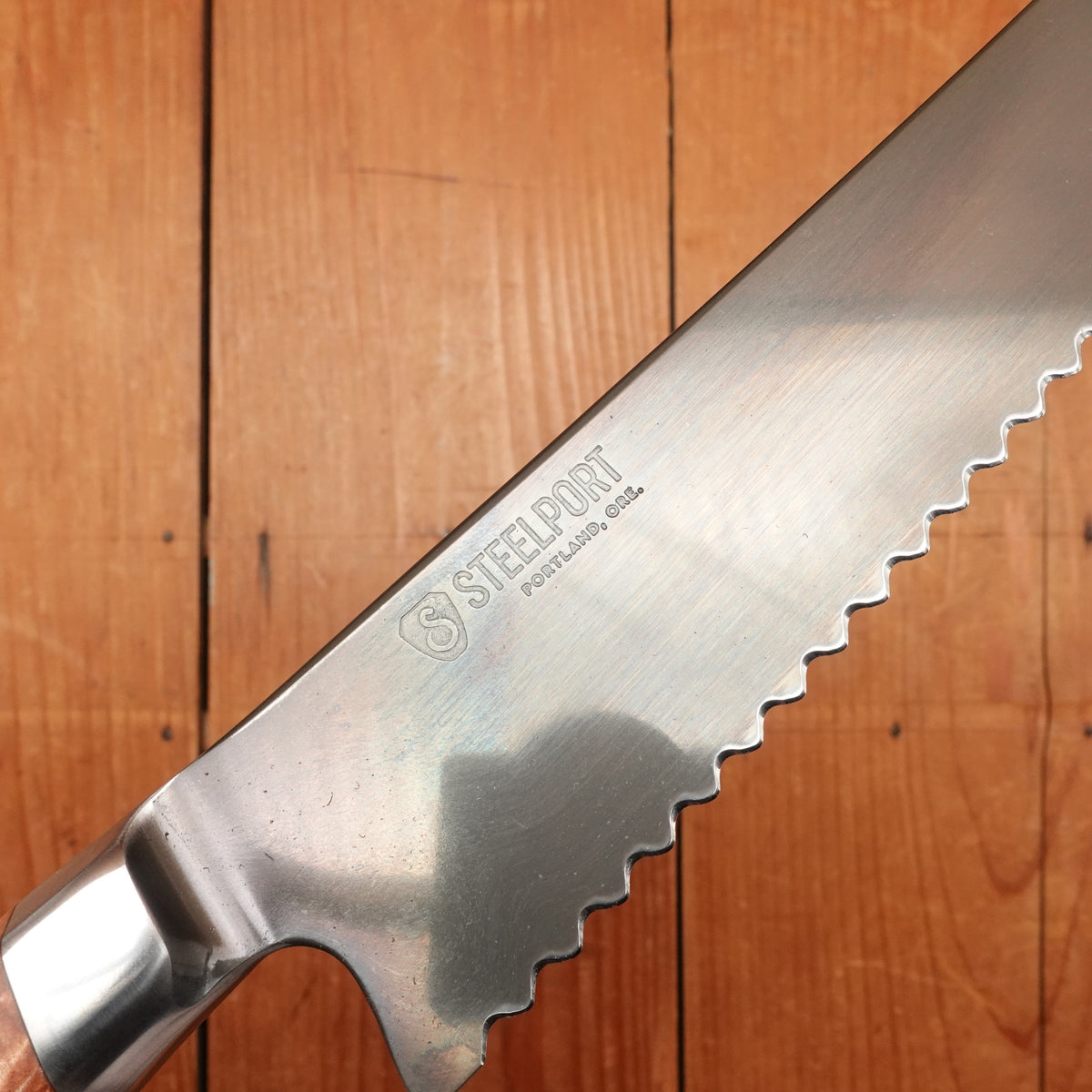
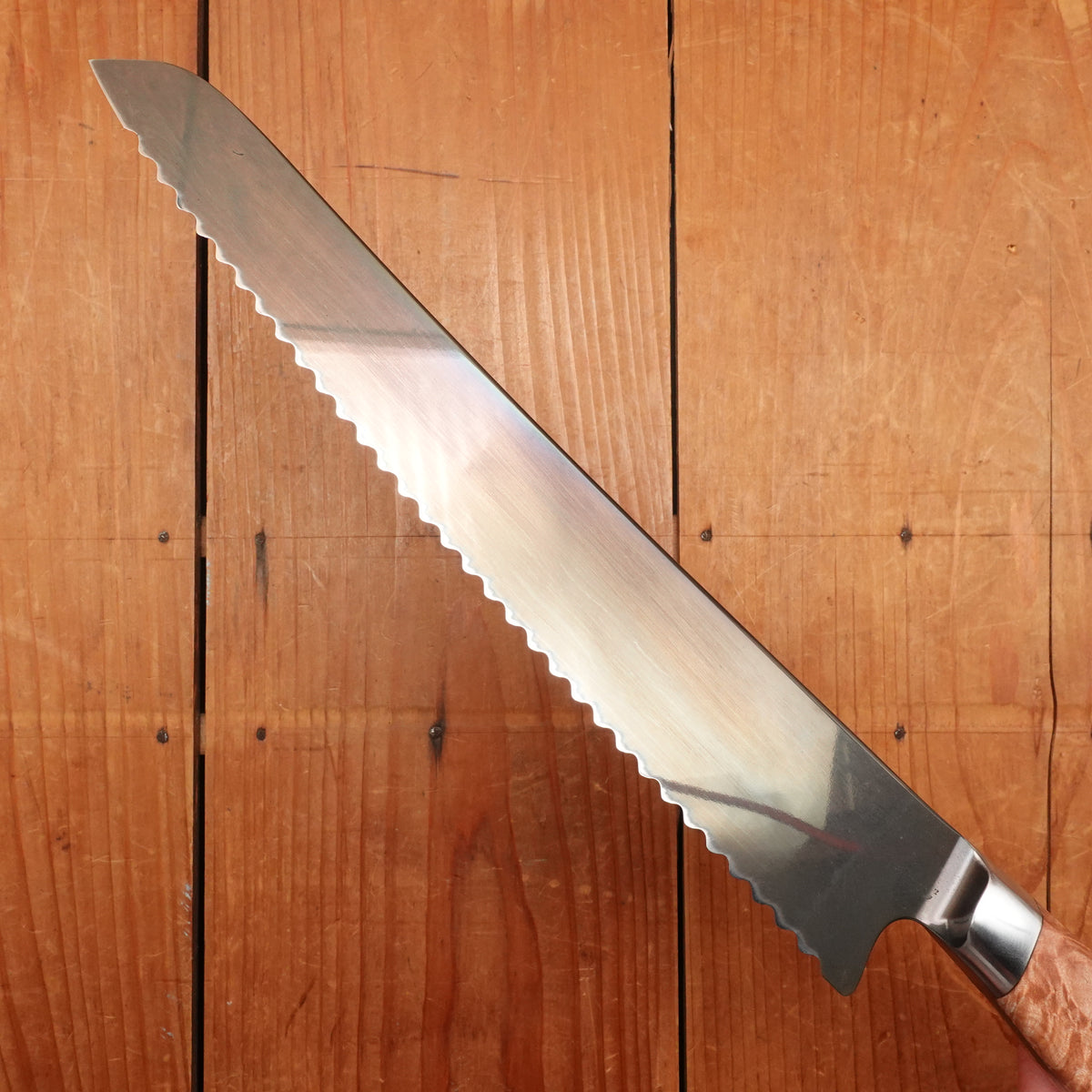
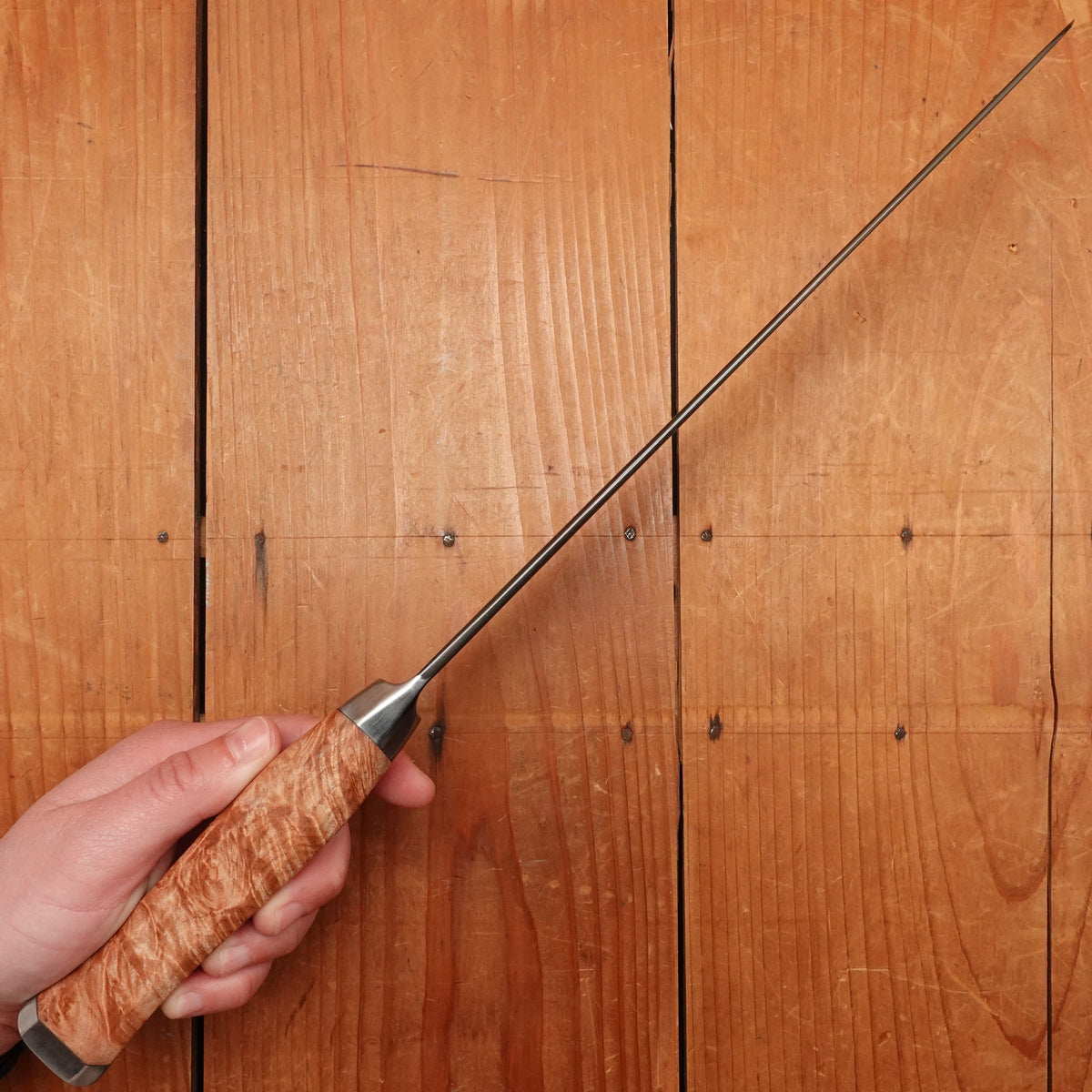
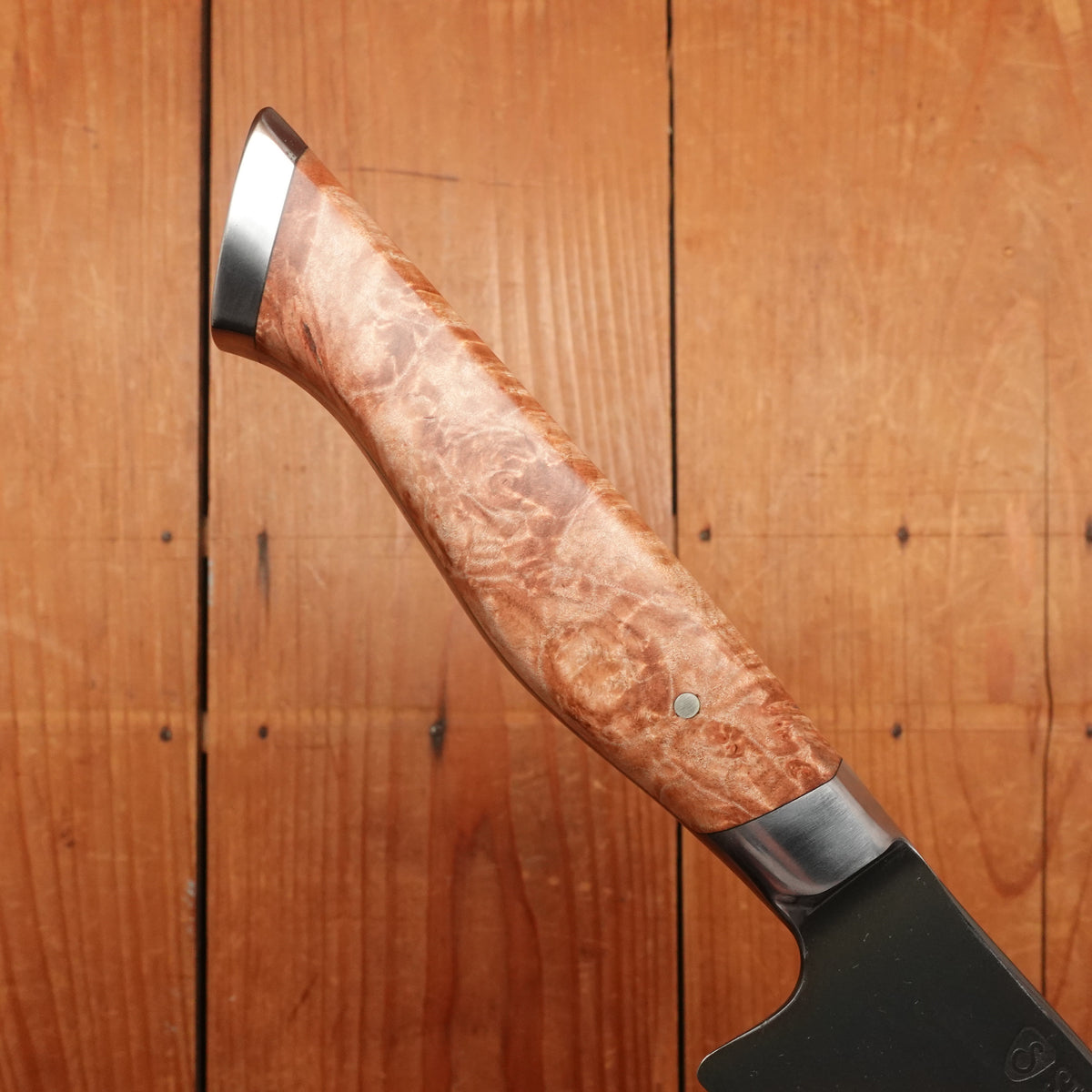
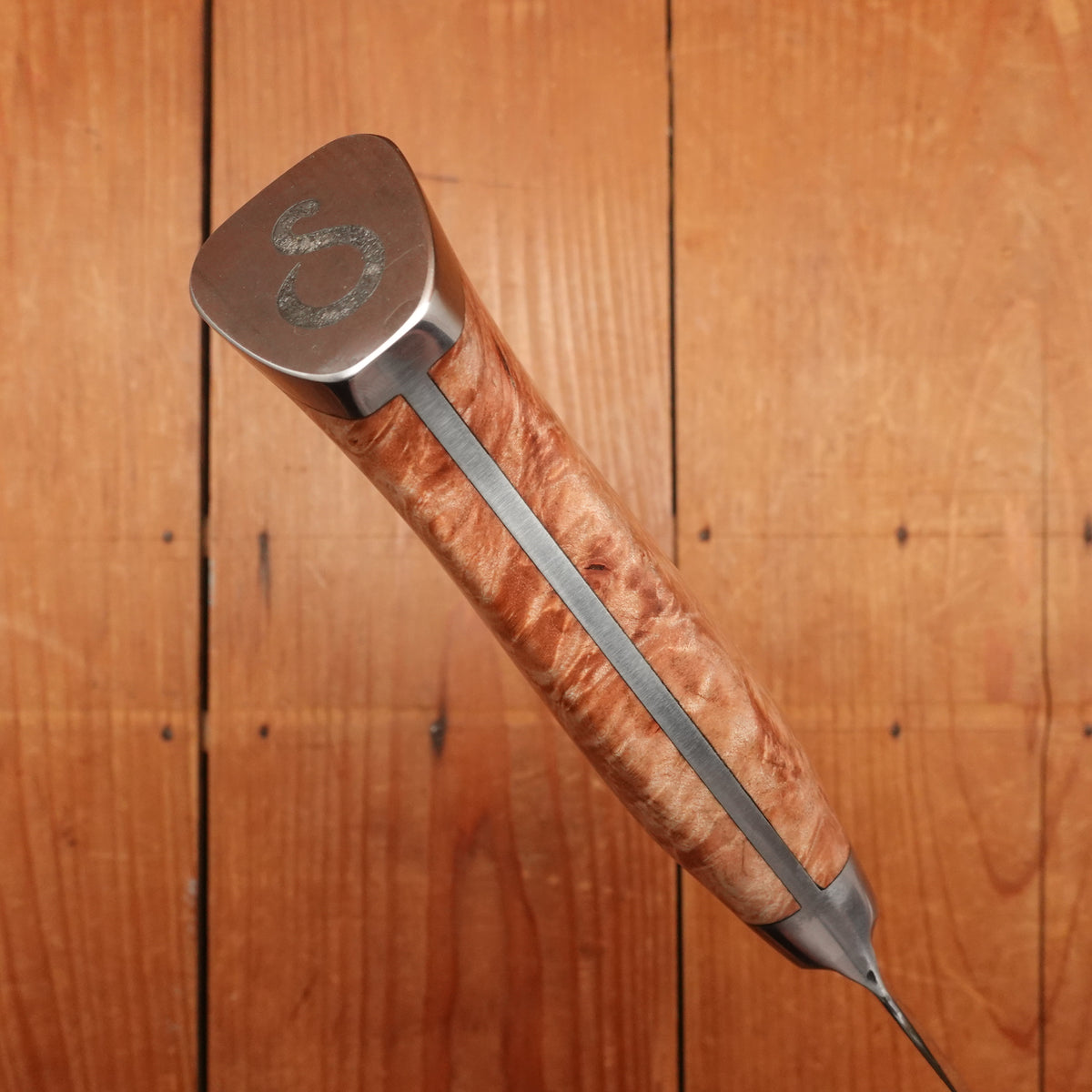
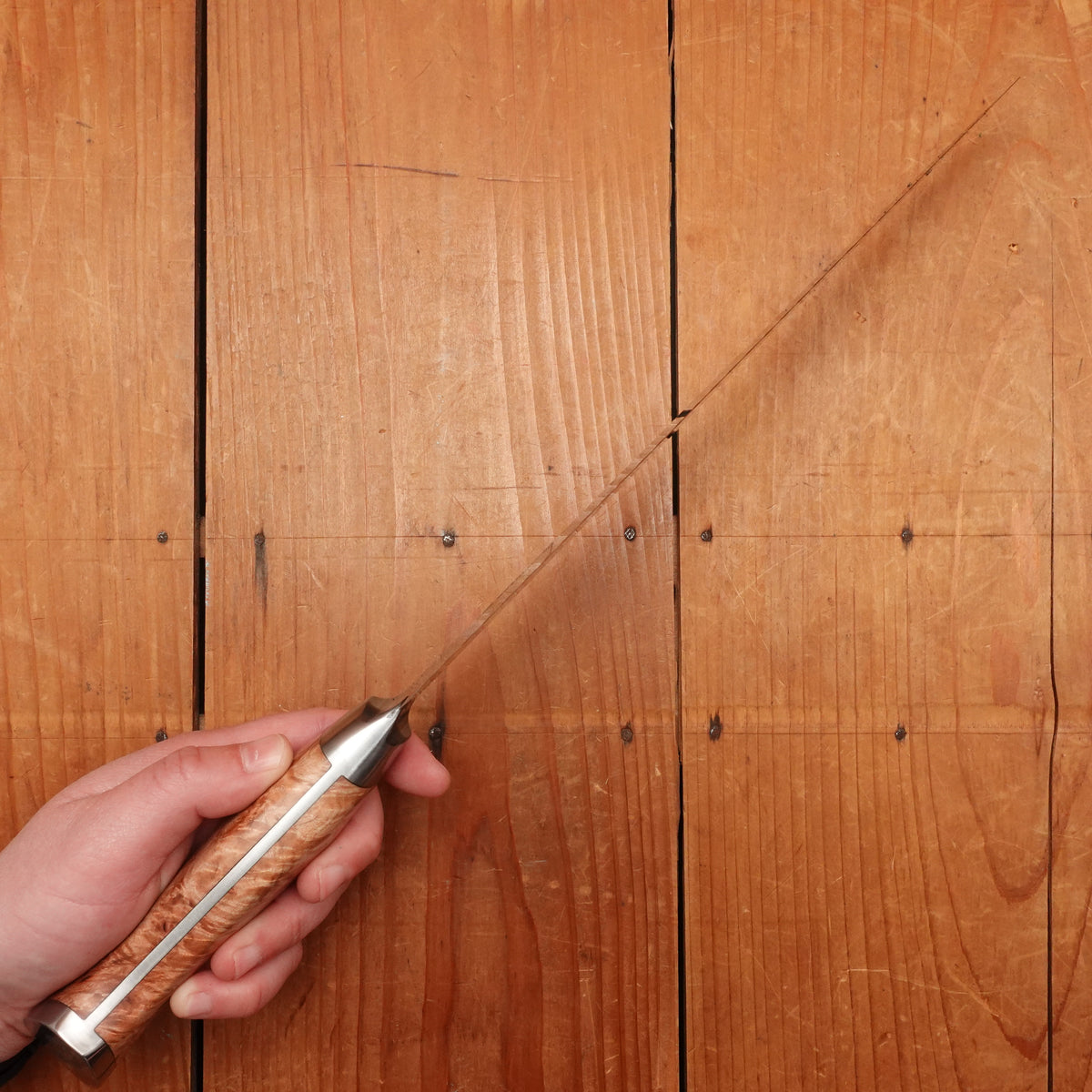
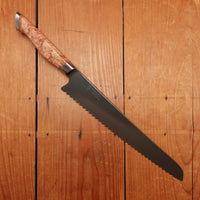
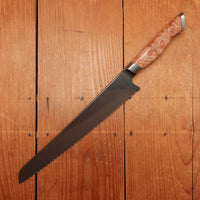
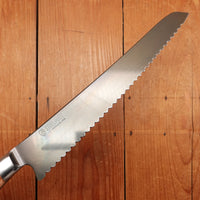
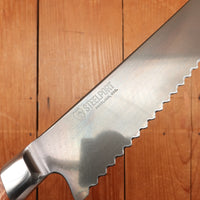
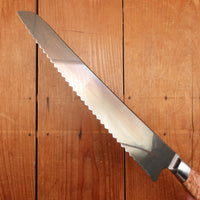
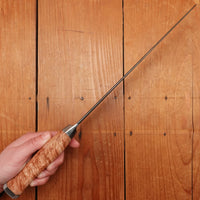
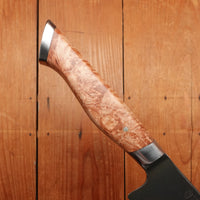
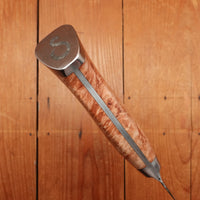
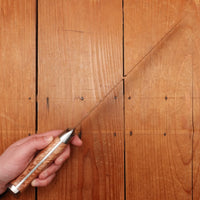
Steelport 10” Bread Knife 52100 Carbon Steel Stabilized Maple
-
Prix ordinaire
-
$638.99
-
Prix soldé
-
$638.99
-
Prix ordinaire
-
SOLDES
Épuisé
-
Prix unitaire
- /par
- Prix ordinaire
- $638.99
- Prix soldé
- $638.99
- Prix ordinaire
- Prix unitaire
- /par
Steelport 10” Bread Knife 52100 Carbon Steel Stabilized Maple
Steelport knives are made in Portland Oregon, USA by Eytan Zias and a highly specialized group of individuals who collaborated in 2020 to bring back the drop forged hand finished American carbon steel knife, albeit in an upgraded form.
First the blade, bolster, tang and pommel are formed in a drop forge, the historical driver of fine American industrial cutlery that has largely disappeared from American cutlery. Next a proprietary 8 stage heat treatment with both oil quenching and air cooling finished by a cryogenic treatment in liquid nitrogen is done one knife at a time. The edge half of the blade is hardened to 65 HRC with the spine and handle being under 40 HRC. The blade is convex ground and polished with heel and spine ground with eased edges, and after an etch in coffee the knife is completed with a stabilized Oregon bigleaf maple handle. Each knife is unique in both the pattern of the maple burl and the banding in the grain of the steel visible from the coffee etch.
After testing the Steelport 10" Bread, we found it has the more robust weight and balance of a Western chef knife with excellent performance. It's an easy, punchy feeling knife with a smooth cutting feel with good food release from it’s convex face. This knife was very easy to sharpen and worked well with a wide variety of finish types; from 3000 to 8000 grit (I thought 4-6K to be the sweet spot).
The smooth, dark patina is not rough and grabby on food and does not impede the cutting. It will change as the knife picks up a patina with use of course as it is not stainless, for this reason it must be wiped dry after use and never put in a dishwasher.
The edge has excellent edge life and toughness (capable of cutting hemp rope 100 times and also being able to cut a brass rod without chipping) while being easy to sharpen and maintain
Part of the Steelport process involves running them through a vibratory vat where the unfinished knives bump into each other and potentially leave marks on the soft spine half of the blade, this is not a defect and will blend into the working surface of these knives as they age.
No kitchen is complete without a bread knife. The STEELPORT Bread Knife is designed to perform equally well cutting bread with hard crusts and softer loafs. It can also be used as a serrated slicer for cutting through BBQ meats, and other hard crust foods.
The STEELPORT Bread Knife features a unique ‘Wavy’ serration (rather than a pointed serration) resulting in a finer, sharper edge which requires less of sawing motion and can slice, rather than saw, through food with ease and is less destructive to both the food and cutting board . The 10” length is the perfect size to get through any loaf.
Brand: Steelport
Producing Area: Portland, Oregon
Profile: Bread
Size: 10"
Steel Type: Carbon
Steel: 52100
Handle: Stabalized Maple Burl
Total Length: 382mm
Handle Length: 126mm
Blade Height: 43mm
Edge Length: 254mm
Thickness: 3mm
Weight: 233g
Hand Orientation: Ambidextrous
Saya:
HRC: 65hrc (Edge)
This is a carbon steel knife. Carbon steel is expected to develop a dark patina with use. It needs to be hand washed and towel dried soon after use. Do not air dry. Do not put it in the dishwasher. Long exposure to moisture and debris will result in rust. Any rust development should be removed with a light abrasive.
Twisting, scraping and heavy use as well as use on hard and very dense objects can lead to edge damage. Use on a quality wooden cutting board will help the knife stay sharper for longer. Use on hard surfaces like plates and bamboo will reduce the edge life and can result in edge damage. Special attention needs to be taken to prevent edge damage. Scraping, twisting and forceful as well as using on hard or very dense foods can result in chipping.
We recommend hand sharpening on whetstones. We have found that most Japanese knives perform best at a finer finish starting around 4000. Avoid pull through sharpeners and non-water cooled mechanized sharpening. Ceramic honing rods are preferred.
Recently Viewed
About Bernal Cutlery
We are a full-service cutlery shop offering sharpening services, Japanese and Western culinary knives, vintage knives, outdoor, pocket and craft knives, cooking tools and accessories. We also offer knife skills and sharpening classes, and more.
We are proud to serve kitchen professionals, knife enthusiasts and home cooks alike. Located in the Mission District of San Francisco, California.
766 Valencia Street, SF, CA 94110
1 Ferry Building, Ste. 26, SF, CA 94110
